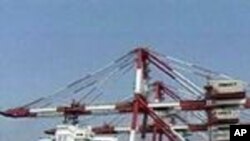The global financial crisis and resulting sharp economic downturn hurting many nations show no sign of easing soon. Bad loans have shut many banks. Those that remain open have stopped lending, and companies and their customers can't get needed credit.
As business slows, millions of people are put out of work. Shrinking demand drags down international trade, and even countries that seemed isolated from the financial excesses that created the mess find themselves suffering along with others.
Government leaders haven't been idle in dealing with the crisis. Vast sums have been injected into the financial system, to keep banks open and resuscitate lending. Taxes have been cut and government spending increased to create jobs, rebuild infrastructure, and bolster consumer confidence and spur demand. In many nations, the drive to stimulate businesses and industries is accompanied by an effort to protect them from foreign competition.
Trade barriers aren't unusual, and in times of economic hardship their advocates become more numerous and vocal. Since the financial crisis began last summer, nations as varied as Argentina, India, Russia and Indonesia have taken steps to raise tariffs or duties, require special import licenses, subsidize their exports or protect their industries and workers in other ways.
History has proven, however, that protectionism protects no one. It can deepen economic problems and shut off a potential engine of growth. The World Bank already predicts that global trade will shrink by 2.1 percent this year, the first decline since 1982. Given the business cutbacks and job losses announced recently, though, the forecast may need to be updated.
With a new administration, U.S. trade policies are under review, but officials remain committed to open markets. President Barack Obama said he opposes U.S. action that would violate our trade obligations or signal protectionism.
As nations try to work their way back to growth and prosperity, weakening global trade can only make the current difficult conditions harder to overcome.
As business slows, millions of people are put out of work. Shrinking demand drags down international trade, and even countries that seemed isolated from the financial excesses that created the mess find themselves suffering along with others.
Government leaders haven't been idle in dealing with the crisis. Vast sums have been injected into the financial system, to keep banks open and resuscitate lending. Taxes have been cut and government spending increased to create jobs, rebuild infrastructure, and bolster consumer confidence and spur demand. In many nations, the drive to stimulate businesses and industries is accompanied by an effort to protect them from foreign competition.
Trade barriers aren't unusual, and in times of economic hardship their advocates become more numerous and vocal. Since the financial crisis began last summer, nations as varied as Argentina, India, Russia and Indonesia have taken steps to raise tariffs or duties, require special import licenses, subsidize their exports or protect their industries and workers in other ways.
History has proven, however, that protectionism protects no one. It can deepen economic problems and shut off a potential engine of growth. The World Bank already predicts that global trade will shrink by 2.1 percent this year, the first decline since 1982. Given the business cutbacks and job losses announced recently, though, the forecast may need to be updated.
With a new administration, U.S. trade policies are under review, but officials remain committed to open markets. President Barack Obama said he opposes U.S. action that would violate our trade obligations or signal protectionism.
As nations try to work their way back to growth and prosperity, weakening global trade can only make the current difficult conditions harder to overcome.




